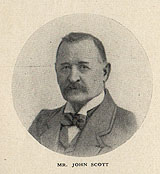| Rudd | << = = | The Early Settlers of the Country John Scott |
= = >> | Stubenrauch |
 Born
in Scotland in 1863, he came to the Falkland Islands in 1882, and worked
there for nearly seven years in rural occupations. As the surroundings did
not encourage great initiative, he decided to go to Patagonia, and to do
so, he took the opportunity offered by the transfer of some sheep bought
by Captain Eberhardt in the islands, and shipped
by the schooner "Rippling Wave", belonging to Braun & Blanchard.
Born
in Scotland in 1863, he came to the Falkland Islands in 1882, and worked
there for nearly seven years in rural occupations. As the surroundings did
not encourage great initiative, he decided to go to Patagonia, and to do
so, he took the opportunity offered by the transfer of some sheep bought
by Captain Eberhardt in the islands, and shipped
by the schooner "Rippling Wave", belonging to Braun & Blanchard.
After a thousand hardships they reached the lands at "Chimen Aike", where the said captain was then settling. Mr. Scott, after having worked for him for some time, assisting him with his practice and experience, entered into an arrangement with his employer which allowed him to lay the foundations of his future success. Eberhardt sold him three hundred sheep, letting him keep them on his land for an indefinite period; that is, until the progressive increase of his own flocks obliged him to occupy all the land on which he had settled.
At the end of five years, Mr. Scott had three thousand sheep, horses, mares and a cart with its corresponding yoke of oxen.
The longed for time had come for Scott to become a settler on his own, and so, without hesitation or fear, which, on the other hand, had no place in his hardy settler's mind he set out with his own stock and some materials which he had purchased for the lands now occupied by the estancia "Bella Vista" belonging to the "Sara Braun" corporation. Shortly after settling down, he went into a partnership with Mr. Dobrée which lasted until 1905. The winter of that year was one of the worst known in the territory, and the settlers suffered enormous losses of stock. Messrs. Scott and Dobrée became discouraged and decided to dispose of those lands where fortune had been so adverse. In a short time they succeeded in their purpose by conveying the estancia "Bella Vista" to Mr. Mayer Braun.
In 1906, Mr. John Scott was stocking the lands where stands today his establishment named "Los Machos", in San Julian. He did it with stock purchased from Messrs. Felton and Clark, and drove it in person, taking seven days to cross to the other side of the Santa Cruz river, with the three thousand animals he was driving.
He reached his journey's end in the middle of April, when the winter was already making itself felt. They had time however, to roof one of the rooms, a very modest one indeed, and under its shelter they were able to hold out for the three months of intense cold. The stock, meanwhile, seeking shelter, had scattered at the place called "Salina Grande" (Great Salt Pit).
Since that time Mr. Scott has gone on working at "Los Machos" with persevering and extraordinary energy, having succeeded in forming an establishment which counts as one of the most complete and progressive of the whole zone.
Source: «La Patagonia Argentina», p.154